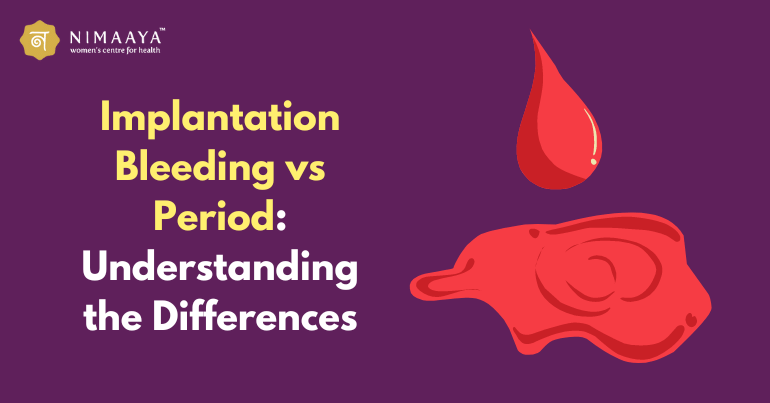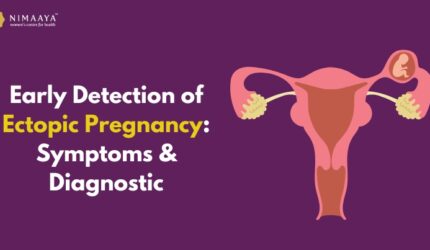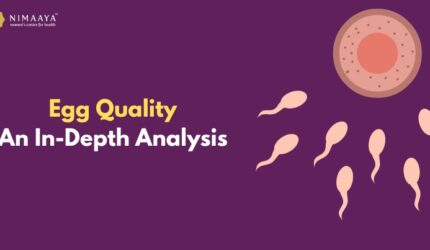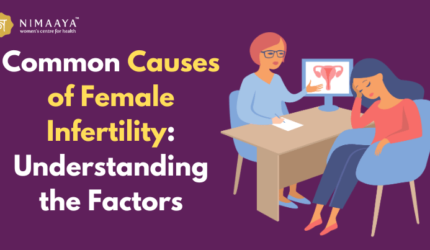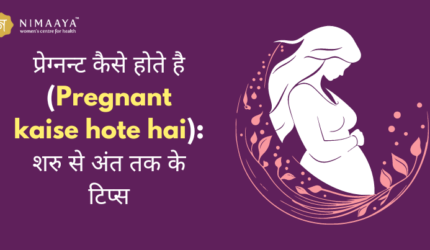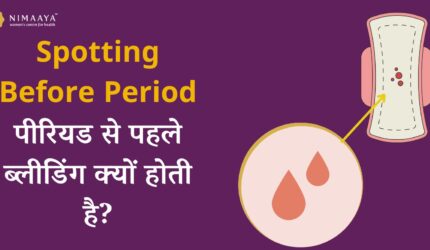While they may look similar, implantation bleeding and a regular period are quite different things. This is why you need to know the implantation bleeding vs period difference when attempting to conceive or to anticipate your menstrual cycle. This blog will examine implantation bleeding vs period, outline the related signs and symptoms of both types, as well as provide points for seeking medical attention.
What is Implantation Bleeding?
It occurs when a fertilized egg attaches itself to the lining of the uterus. It can cause light spotting or bleeding, which makes it easy for some people to mistake implantation bleeding for a normal period. According to experts, implantation bleeding takes place from about 10-14 days after conception and tends to be lighter and shorter than ordinary periods.
Implantation Bleeding Color
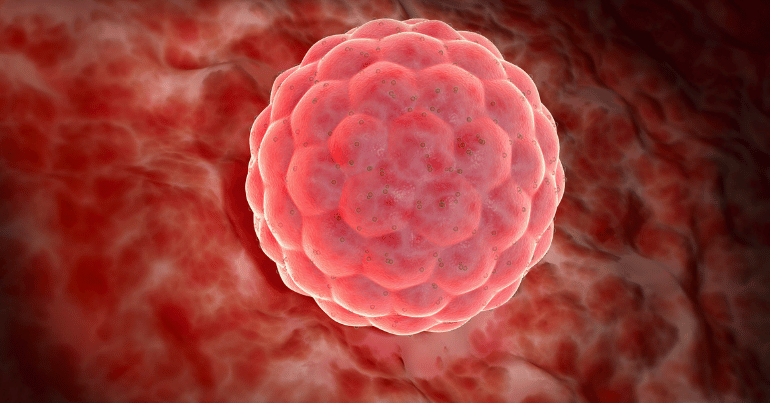
The implantation bleeding color usually differs from that of menstruation. Unlike menstruation characterized by bright red blood, it may present as light pink or brownish discharge. The reason is that there is less blood released during implantation compared to that associated with menstruation hence it does not flow so readily this color difference. Moreover, mild cramps or spotting can accompany implantation but its duration is significantly shorter than in normal periods. However, not all women undergo implantation bleeding.
Period: What to Expect

A period, or menstruation, is the sloughing off of the lining of the uterus when pregnancy does not take place. This accounts for blood flow which is heavier and more prolonged, normally lasting 3 to 7 days. During this period, the body releases hormones that can consequently lead to some physical and emotional symptoms such as cramps, bloating, or mood swings. For most women, it forms part of their natural menstrual cycle.
Implantation Bleeding vs Period: Key Differences
Discriminating between implantation bleeding vs period is quite challenging. However, there are good reasons why they differ in these aspects.
Flow and Duration:
Implantation bleeding is lighter than menstrual bleeding; it lasts for a shorter time period, usually a few hours or up to two days. Sometimes, this kind of bleeding could occur with low cramping or spotting, around 6-12 days after conception.
Color:
Implantation bleeding appears as light pinkish-grey or brown stains while menstrual blood is generally dark red in color or bright red. It usually lasts from hours to days whereas periods can go on for up to one week. On top of that, menstrual pains may be more intense than those experienced during implantation bleeding which may not occur at all.
Timing:
Implantation bleeding usually occurs between six to twelve days after ovulation, when one would expect her period. But in case she has regular cycles, it may cause some variations from her usual starting date of menstruation. In contrast with implantation bleeding which is generally very light and doesn’t last long like low periods do, normal menstruation can last for four or five days. Keeping track of one’s menstrual cycles as well as any other changes is critical to differentiate between normal menstruation and the implantation bleed.
Symptoms of Implantation Bleeding
Implantation bleeding comes along with other early pregnant symptoms that make it stand apart from monthly menstrual periods. Some of these common indications include:
Mild Cramping:
During implantation, some women may have mild cramps; however, they are not as severe as monthly menstrual cramps. Light spotting or bleeding might accompany this cramping and it is fairly typical for implantation signs. This normally occurs around six to twelve days following conception and could last only for several hours or a few days.
Breast Tenderness:
These hormonal fluctuations during very early pregnancy can lead to such manifestations including nausea, fatigue, and breast tenderness. When experiencing such symptoms, it’s crucial to contact a healthcare provider that would aid in confirming one’s pregnancy while providing proper assistance.
Also Read: The Ultimate Guide to Breastfeeding: Everything You Need to Know
Nausea:
When you experience nausea during the early stages of pregnancy, it can be described as “morning sickness.” Usually, this signs of implantation manifests approximately 6-8 weeks following fertilization and can persist for the entire first trimester. Other manifestations of these symptoms include vomiting and aversion to certain foods among others.
Fatigue:
First-trimester hormonal changes may cause fatigue among pregnant women. More often than not, this fatiguing feeling is more pronounced during the first three months when their bodies are adjusting to new adjustments. Resting frequently is vital if you’re pregnant because it will give your body time to recover from intensive weariness episodes at regular intervals.
Also Read: Implantation Symptoms: A Comprehensive Guide
When Should You Take A Pregnancy Test
If you suspect implantation bleeding, it’s important to wait a few days before taking a pregnancy test. The reason is that taking the tests too early would lead to finding out empty stomach for hcg (human chorionic gonadotropin). In case of continuous unusual bleeding or if pregnancy symptoms persistently worry you, reach out for advice and evaluation from medical experts. In most instances, implantation bleeding tends to be light and of short duration; hence any extended period or heavy flow should be adequately taken care of without delay.
Nimaaya IVF Center: Comprehensive Fertility Care
For individuals facing difficulties in having babies, we have advanced fertility treatments like no other and an understanding care perspective. The facility is famous for its remarkable success rates, tailor-made treatment plans, and a team of multi-disciplinary fertility specialists. Our staff is devoted to providing support and counsel throughout the whole process of getting pregnant so that patients are empowered and knowledgeable about their journey to parenthood. We aim to help individuals make their family dreams come true through cutting-edge science and customized care.
Services Offered
Nimaaya IVF Center offers several fertility services such as:
IVF (In Vitro Fertilization):
Egg cells are fertilized by sperm outside the body and then put back into the uterus. Couples dealing with the inability to have babies or genetic abnormalities usually resort to IVF treatment to give them a child. Factors such as your age and underlying conditions may influence the success probability of IVF.
IUI (Intrauterine Insemination):
This is a less traumatic procedure where sperm are placed directly in the womb around ovulation. This method is commonly advised for those with low fertility issues or though it remains obscure infertility cases. In comparison to IVF, though generally cheaper, IUI treatment has less invasive procedures; however, there could be some individuals who will have poor outcomes following this procedure.
Egg Freezing:
One way of saving eggs for future use, giving ladies greater power over their reproductive timing. Egg freezing is often opted for by women who want to postpone their childbirth either for personal reasons or medical reasons such as career advancement or medical treatments that could affect fertility. This procedure is very beneficial to women who are not yet ready to start a family but want to increase their chances of having biological children later in life.
Genetic Testing
The process involves evaluating embryos before they are implanted in the uterus, which is referred to as preimplantation genetic testing aimed at finding the healthiest among them and inserting only those who are so, and checking for hereditary diseases in gametes before fertilization occurs reducing hereditary conditions among children born. This latest approach used in assisted reproduction has made it possible for couples intending to have babies to consider several options and alternatives.
Patient-Centered Care
We take pride in offering personalized care that is customized for every patient based on their requirements. The center’s comfortable environment helps ensure patients feel at ease and familiarized with their fertility journey. Our specialists are always ready to support patients at all times emotionally and cater to their unique needs with tailor-made treatment plans. We believe that patients should be empowered to take control of their own fertility treatment decisions through informed choices.
Implantation Bleeding vs Period: When to Contact a Medical Professional
If there is any vaginal bleeding that is not consistent with what the woman is used to, she should visit a doctor who will provide her with help that will stop any disease and make her supper pregnant. The significance of understanding whether it’s implantation bleeding or not is important when trying to conceive or suspecting you could be pregnant in the first few weeks. Implantation bleeding is normally lighter and shorter than a normal period. Therefore, tracking these inconveniences could be beneficial alongside speaking with your doctor for tailor-made suggestions.
Conclusion
For women hoping to have children, particularly those who are attuned to their biological rhythms, knowing how periods differ from ovulation is essential. Paying attention to color flow timing during menstruation makes it simpler to comprehend the body’s cycles. Nimaaya IVF Center has established itself as a prominent provider of fertility expertise and support with its extensive range of services tailored to assist individuals or couples fulfill their dream of becoming parents.
FAQs
Can you have cramps with implantation bleeding?
Yes, there can be some mild cramping during implantation bleeding however; it is usually less intense compared to menstrual period cramping.
How can I tell if it’s implantation bleeding or my period?
The timing of your blood flow, its coloration, or even any other related symptoms can help distinguish between these two occurrences. For instance, implantation bleeding is lighter in nature occurring prior to one’s anticipated menstrual dates plus may be associated with other early pregnancy symptoms e.g. nausea or tenderness around breasts.
Can implantation bleeding be heavy?
Generally speaking, implantation bleeding is very light; therefore if you encounter lots of blood then it is highly likely that such a situation could indicate either a normal period or an entirely different medical condition which would require consultation from qualified medical personnel only.
When should I see a doctor about bleeding?
However, if there is any exceptionally heavy discharge experienced during this phase along with severe pain then medical attention needs to be sought immediately, especially in cases where one has doubts over his/her early stages of gestation. In this case, it would help differentiate between normal implantations and abnormal bleeding caused by something else entirely different like infections or hormonal imbalances, etc.

